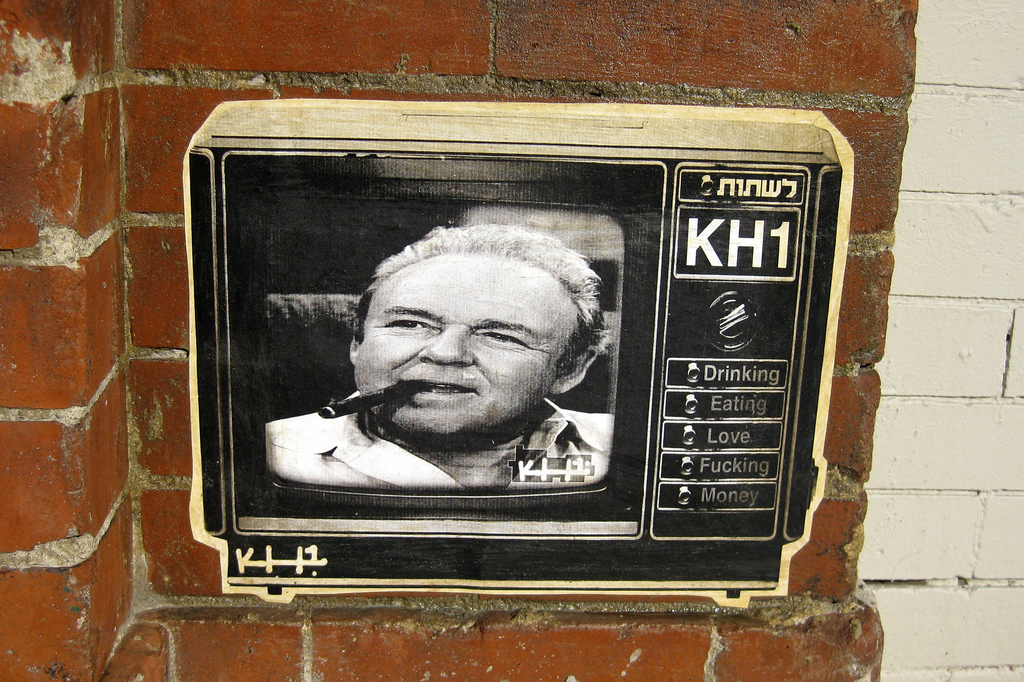
After a wildly successful eight year run, “All in the Family” aired its 200th episode on March 4, 1979. By then, the show had irrevocably changed the image of the American family, but creator Norman Lear initially faced challenges from network censors who feared the show was too politically charged and producers who viewed the show as a marked departure from the popular family sitcoms of the 1960s. Below, in Archie Bunker’s America: TV in an Era of Change 1968-1978, Josh Ozersky comments on the beginnings of “All in the Family” and its most unforgettable personality, Archie Bunker.
Norman Lear was a man of liberal sensibilities who sympathized with the movement against the war, and agreed with critics who felt that television was one great missed opportunity. Discussing the show in retrospect many years later, Lear described the context of what would become ‘All in the Family’’s debut. “I didn’t know this when I started with All in the Family, but that show was the first to make social issues integral to evening television sitcom. … We followed a whole bunch of shows like Father Knows Best, Leave It to Beaver, Green Acres, and other shows of the ‘60s. They were all fine shows but you would think by watching them that America had no blacks, no racial tensions, that there was no Vietnam.”
The nostalgic theme music of All in the Family is not merely scene-setting. Archie Bunker’s a relic of the past, the show reassures its audience. Archie is a creature of the past, lingering into the present as an unquiet spirit, a ghost who has outlived the era that created him. Norman Lear knows that. You and I, the audience, know it. Mike and Gloria know it. Even Edith, for all of her servility, knows it. The only one who doesn’t know it is Archie, and it is this very indomitability of the character, and Carroll O’Connor’s gifted rendering of it, that elevates him above traditional TV heavies and bigots. They “learn their lesson” at the end of every episode. That Archie never learns his lesson is the source of his great iconic power. He was the Sisyphus of the hardhats, constantly attempting to roll Meathead, Gloria, Edith, Norman Lear, his neighbors, the scriptwriters, and the political climate of the 1960s generally back up the hill of vanished time.
This cultural power of Archie went a long way toward earning the show its fabulously wide audience (by the 1974-75 season, an average episode was viewed by a fifth of the total population). But the real key was that the older, put-upon Americans whom Archie represented enjoyed him far more than they might have been expected to, given his full-time status as butt and buffoon. “What’s great about that show,” a railroad worker told Life Magazine “is that it is biased. What I mean is, it’s just like you feel inside yourself. You think it, but old Archie, he says it, by damn.” Consider this exchange, from the first episode, “Meet the Bunkers.” “I just want to learn how to help people,” Mike tells Archie, explaining why he is studying sociology in college.
Archie: Your mother-in-law and me is people. Help us and go to work!
Mike: I know what’s bothering you. You’re upset because I was nailing you on that law and order thing.
Archie: You was nailing me?
Mike: Yeah, that’s right, and now I’m going to tell you something. I know I promised, Gloria, but I feel I got to say this. You know why we have a breakdown of law and order in this country, Archie? Because we got poverty, real poverty. And you know why we got that? Because guys like you are unwilling to give the black man, the Mexican American, and all the other minorities their just and rightful hard-earned share of the American dream!
Archie: Now let me tell you something. If your spics and your spades want their share of the American dream, let them go out and hustle for it, just like I done.The tension between Mike and Archie’s language mirrors their political positions. The sentiment that Archie is voicing here, however, is not so easily dismissed. Because the show drew on reality for its conflict, rather than on plot contrivances (as in traditional “situational comedies”), the conflict is charged, animated from within. The twilight of “the American dream” was no joke. And what may have made Archie even more appealing was the lengths to which his makers loaded the deck against him.
–Excerpted by Jodie C. Liu
*Photo courtesy wallyg.




Send A Letter To the Editors